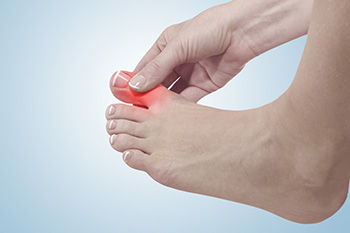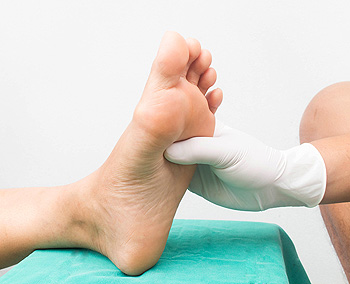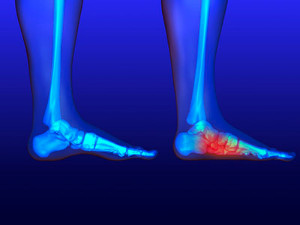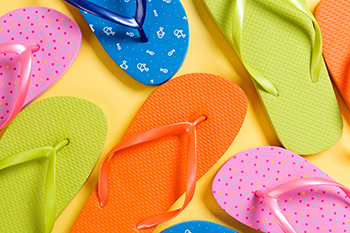Connect With Us
Blog
Items filtered by date: January 2023
Gout Can Happen to Anyone

Gout is an arthritic condition that is caused by excess uric acid in the blood stream and a buildup and crystallization of these compounds in the body. This can happen from eating or drinking foods or beverages with purines, such as beer, red meat, and certain types of seafood. Symptoms of gout include redness, joint tenderness, and severe pain. It often affects the joint in the big toe first, and may radiate to the other toes. Gout is perceived as a condition that afflicts older men. Getting gout increases with age, and women are more apt to develop gout after menopause. Gout can result in frequent or infrequent attacks. If you think you may have gout, please see a podiatrist for diagnosis and treatment as soon as possible.
Gout is a painful condition that can be treated. If you are seeking treatment, contact Dr. Michael D. Garvin from Florida. Our doctor will treat your foot and ankle needs.
What Is Gout?
Gout is a form of arthritis that is characterized by sudden, severe attacks of pain, redness, and tenderness in the joints. The condition usually affects the joint at the base of the big toe. A gout attack can occur at any random time, such as the middle of the night while you are asleep.
Symptoms
- Intense Joint Pain - Usually around the large joint of your big toe, and it most severe within the first four to twelve hours
- Lingering Discomfort - Joint discomfort may last from a few days to a few weeks
- Inflammation and Redness -Affected joints may become swollen, tender, warm and red
- Limited Range of Motion - May experience a decrease in joint mobility
Risk Factors
- Genetics - If family members have gout, you’re more likely to have it
- Medications - Diuretic medications can raise uric acid levels
- Gender/Age - Gout is more common in men until the age of 60. It is believed that estrogen protects women until that point
- Diet - Eating red meat and shellfish increases your risk
- Alcohol - Having more than two alcoholic drinks per day increases your risk
- Obesity - Obese people are at a higher risk for gout
Prior to visiting your podiatrist to receive treatment for gout, there are a few things you should do beforehand. If you have gout you should write down your symptoms--including when they started and how often you experience them, important medical information you may have, and any questions you may have. Writing down these three things will help your podiatrist in assessing your specific situation so that he or she may provide the best route of treatment for you.
If you have any questions, please feel free to contact our offices located in Port St. Lucie, FL . We offer the newest diagnostic and treatment technologies for all your foot care needs.
Tips for Protecting Your Feet if You Have Diabetes

Many people with diabetes begin to develop problems in their lower legs and feet. Many develop corns, calluses, blisters, and skin ulcers. The main cause of ulcers is an increased level of blood sugar in the body, which can damage nerves (specifically those in the extremities). The result is a condition known as diabetic neuropathy, which is experienced by about 70 percent of diabetics, studies show. The numbing sensation to the feet invites all sorts of problems, including cracked heels, sores that go undetected, and increased exposure to bacterial and fungal infections. It is suggested that diabetics examine their feet daily for cracks, wounds, and sores. Wear shoes that fit properly, and avoid socks that are too tight. Avoid walking barefoot, indoors and out. Keep the feet clean and thoroughly dried each day. Quitting smoking and doing low-impact exercise are recommended by experts. Most importantly, if you have foot problems related to diabetes, please contact a podiatrist for regular visits to stay on top of any complications that may develop.
Diabetic foot care is important in preventing foot ailments such as ulcers. If you are suffering from diabetes or have any other concerns about your feet, contact Dr. Michael D. Garvin from Florida. Our doctor can provide the care you need to keep you pain-free and on your feet.
Diabetic Foot Care
Diabetes affects millions of people every year. The condition can damage blood vessels in many parts of the body, especially the feet. Because of this, taking care of your feet is essential if you have diabetes, and having a podiatrist help monitor your foot health is highly recommended.
The Importance of Caring for Your Feet
- Routinely inspect your feet for bruises or sores.
- Wear socks that fit your feet comfortably.
- Wear comfortable shoes that provide adequate support.
Patients with diabetes should have their doctor monitor their blood levels, as blood sugar levels play such a huge role in diabetic care. Monitoring these levels on a regular basis is highly advised.
It is always best to inform your healthcare professional of any concerns you may have regarding your feet, especially for diabetic patients. Early treatment and routine foot examinations are keys to maintaining proper health, especially because severe complications can arise if proper treatment is not applied.
If you have any questions please feel free to contact our offices located in Port St. Lucie, FL . We offer the newest diagnostic and treatment technologies for all your foot and ankle needs.
Arch Development in the Foot

Most people are born with flat feet, and the arch generally starts to form by the age of six. The late teenage years is typically when the arch is completely developed, but may not happen in many adults. This may come from having a genetic disposition, or from an abnormal foot structure. Obesity may contribute to adults having flat feet, and it may be prevalent among pregnant women. Additionally, enduring a sports injury may lead to flat feet, and it can be natural among the elderly population. It is easy to notice flat feet, and is obvious while standing on the floor as the foot lies completely flat. The area where the arch would normally be can be strengthened by performing specific stretches and exercises. It may also be beneficial to wear shoes that have extra cushioning and support, and losing weight may help, if applicable. If you have flat feet, it is strongly urged that you are under the care of a podiatrist who can help you to manage this condition.
Flatfoot is a condition many people suffer from. If you have flat feet, contact Dr. Michael D. Garvin from Florida. Our doctor will treat your foot and ankle needs.
What Are Flat Feet?
Flatfoot is a condition in which the arch of the foot is depressed and the sole of the foot is almost completely in contact with the ground. About 20-30% of the population generally has flat feet because their arches never formed during growth.
Conditions & Problems:
Having flat feet makes it difficult to run or walk because of the stress placed on the ankles.
Alignment – The general alignment of your legs can be disrupted, because the ankles move inward which can cause major discomfort.
Knees – If you have complications with your knees, flat feet can be a contributor to arthritis in that area.
Symptoms
- Pain around the heel or arch area
- Trouble standing on the tip toe
- Swelling around the inside of the ankle
- Flat look to one or both feet
- Having your shoes feel uneven when worn
Treatment
If you are experiencing pain and stress on the foot you may weaken the posterior tibial tendon, which runs around the inside of the ankle.
If you have any questions please feel free to contact our offices located in Port St. Lucie, FL . We offer the newest diagnostic and treatment technologies for all your foot and ankle needs.
Reminder: When Was the Last Time...?
Obesity and Foot Swelling

Obese individuals can be more susceptible to developing any number of foot conditions. This is because having an unhealthy level of extra body weight can wreak havoc on the feet and lower legs in different ways. One often overlooked consequence that obesity can have on the feet is swelling, or edema, in the feet. When a person carries an excessive amount of body weight around, they are essentially putting more pressure on the joints, especially those in the feet. Obese individuals can put an extreme amount of pressure on the ankle joints in particular. As a result, there can be a significant amount of fluid retention in the affected areas, as well as the storage of hormones in fat cells. Consequently, the body can experience a pesky kind of swelling in the ankles, feet, and lower legs. If you are someone that struggles with obesity, contact a podiatrist today to learn what you can do to combat any foot swelling that you are currently experiencing.
Obesity has become very problematic at this point in time and can have extremely negative effects on the feet. If you’re an obese individual and are concerned about your feet, contact Dr. Michael D. Garvin from Florida. Our doctor can provide the care you need to keep you pain-free and on your feet.
Obesity and Your Feet
Since your feet are what support your entire weight when standing, any additional weight can result in pain and swelling. Being overweight is one of the main contributors to foot complications.
Problems & Complications
Extra Weight – Even putting on just a few extra pounds could create serious complications for your feet. As your weight increases, your balance and body will shift, creating new stresses on your feet. This uneven weight distribution can cause pain, even while doing the simplest tasks, such as walking.
Diabetes – People who are overweight are at serious risk of developing type-2 diabetes, which has a drastic impact on the health of your feet. As you get older, your diabetes might worsen, which could lead to loss of feeling in your feet, sores, and bruises. You could also become more prone to various infections.
Plantar fasciitis – Pressure and stress that is placed on muscles, joints, and tendons can trigger plantar fasciitis, which is an inflammation of tissue that forms along the bottom of the foot.
If you have any questions please feel free to contact our offices located in Port St. Lucie, FL . We offer the newest diagnostic and treatment technologies for all your foot and ankle needs.
Protecting the Toes

One of the most important functions that a good pair of shoes serves is to essentially protect the toes from injury. The toes are resilient yet very delicate parts of the human body. Good shoes have a toe box that can insulate and protect the toes from falling objects or from being stubbed. One of the many downsides of wearing open-toed sandals like flip-flops is that this kind of shoe ultimately does not protect the toes at all. Flip flops, in other words, leave the toes completely exposed. Not only does this make the toes more vulnerable to becoming injured, but it also exposes them to the elements and the weather, which has its share of problems and complications. Medical professionals recommend limiting the time in which flip-flops are worn to ensure adequate protection of the toes. If you are someone that enjoys wearing flip-flops, contact a podiatrist today to see what can be done to protect the feet.
Flip-flops are not always the best choice of footwear. If you have any concerns about your feet or ankles, contact Dr. Michael D. Garvin from Florida. Our doctor will assist you with all of your foot and ankle needs.
Flip-Flops and Feet
When the weather starts warming up, people enjoy wearing flip-flops. Flip-flops are comfortable, stylish, and easy to slip on and off; they're perfect for any summer beach goer. However, these shoes can cause harm to the feet.
How Can Flip-Flops Affect Me Long-Term?
- Ankle problems
- Hip problems
- Lower back problems
- Pain in the balls of the feet
- Problems with foot arches
- Changes in the way you walk
Are There Injuries Associated with Flip-Flops?
Yes. Since flip-flops are relatively weak and do not provide the same amount of support as sneakers, people who wear flip-flops regularly are more susceptible to injuries. On top of that, the open nature of the shoe makes your feet more prone to other problems, such as cuts and even infections. Common injuries and ailments include:
- Sprained ankles
- Blisters
- Infections
- Cuts and Scrapes
I like Wearing Flip-Flops. Are There Safe Alternatives?
When buying flip-flops, try to find ones that have sturdy soles and that are made of high-quality materials that will support for your feet. These flip-flops will cost more but will also last longer as a result.
If you have any questions please feel free to contact our offices located in Port St. Lucie, FL . We offer the newest diagnostic and treatment technologies for all your foot and ankle needs.
Blog Archives
- April 2024
- March 2024
- February 2024
- January 2024
- December 2023
- November 2023
- October 2023
- September 2023
- August 2023
- July 2023
- June 2023
- May 2023
- April 2023
- March 2023
- February 2023
- January 2023
- December 2022
- November 2022
- October 2022
- September 2022
- August 2022
- July 2022
- June 2022
- May 2022
- April 2022
- March 2022
- February 2022
- January 2022
- December 2021
- November 2021
- October 2021
- September 2021
- August 2021
- July 2021
- June 2021
- May 2021
- April 2021
- March 2021
- February 2021
- January 2021
- December 2020
- November 2020
- October 2020
- September 2020
- August 2020
- July 2020
- June 2020
- May 2020
- April 2020
- March 2020
- February 2020
- January 2020
- December 2019
- November 2019
- October 2019
- September 2019
- August 2019
- July 2019
- June 2019
- May 2019
- April 2019
- March 2019
- February 2019
- January 2019
- December 2018
- November 2018
- October 2018
- September 2018
- August 2018
- July 2018
- June 2018
- May 2018
- April 2018
- March 2018
- February 2018
- January 2018
- December 2017
- November 2017
- October 2017
- September 2017
- August 2017
- July 2017
- June 2017
- May 2017
- April 2017
- March 2017
- February 2017
- January 2017
- December 2016
- November 2016
- October 2016
- September 2016
- August 2016

